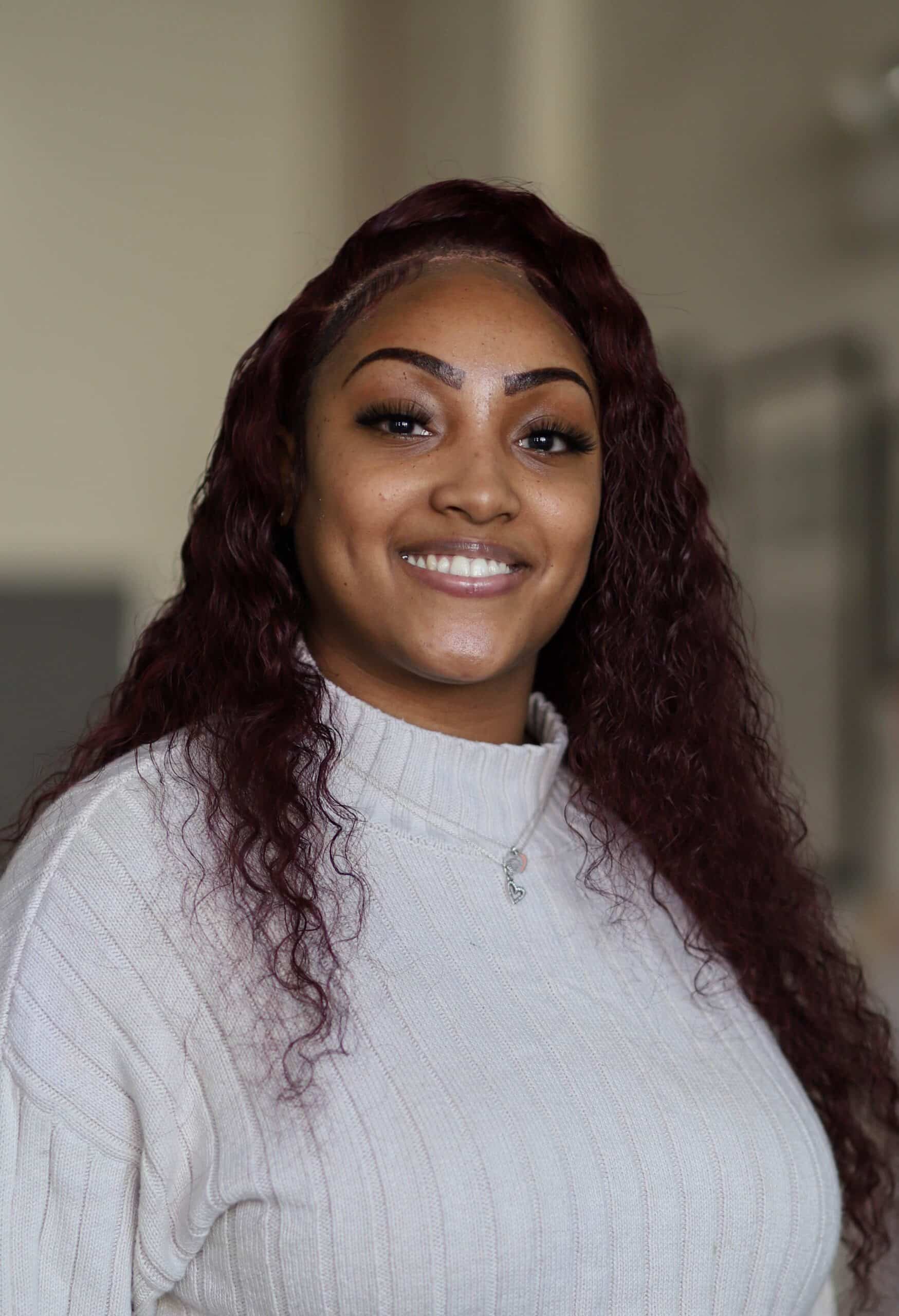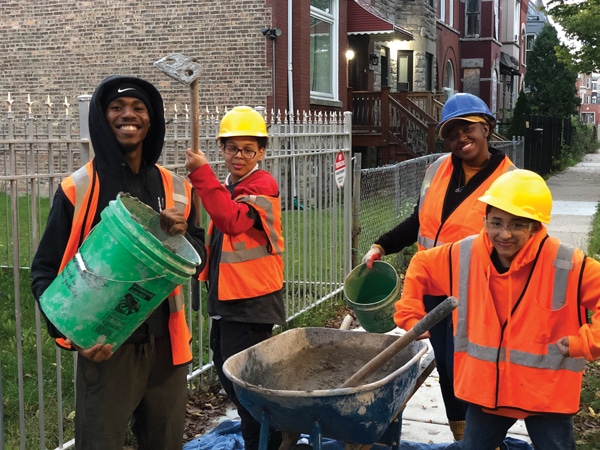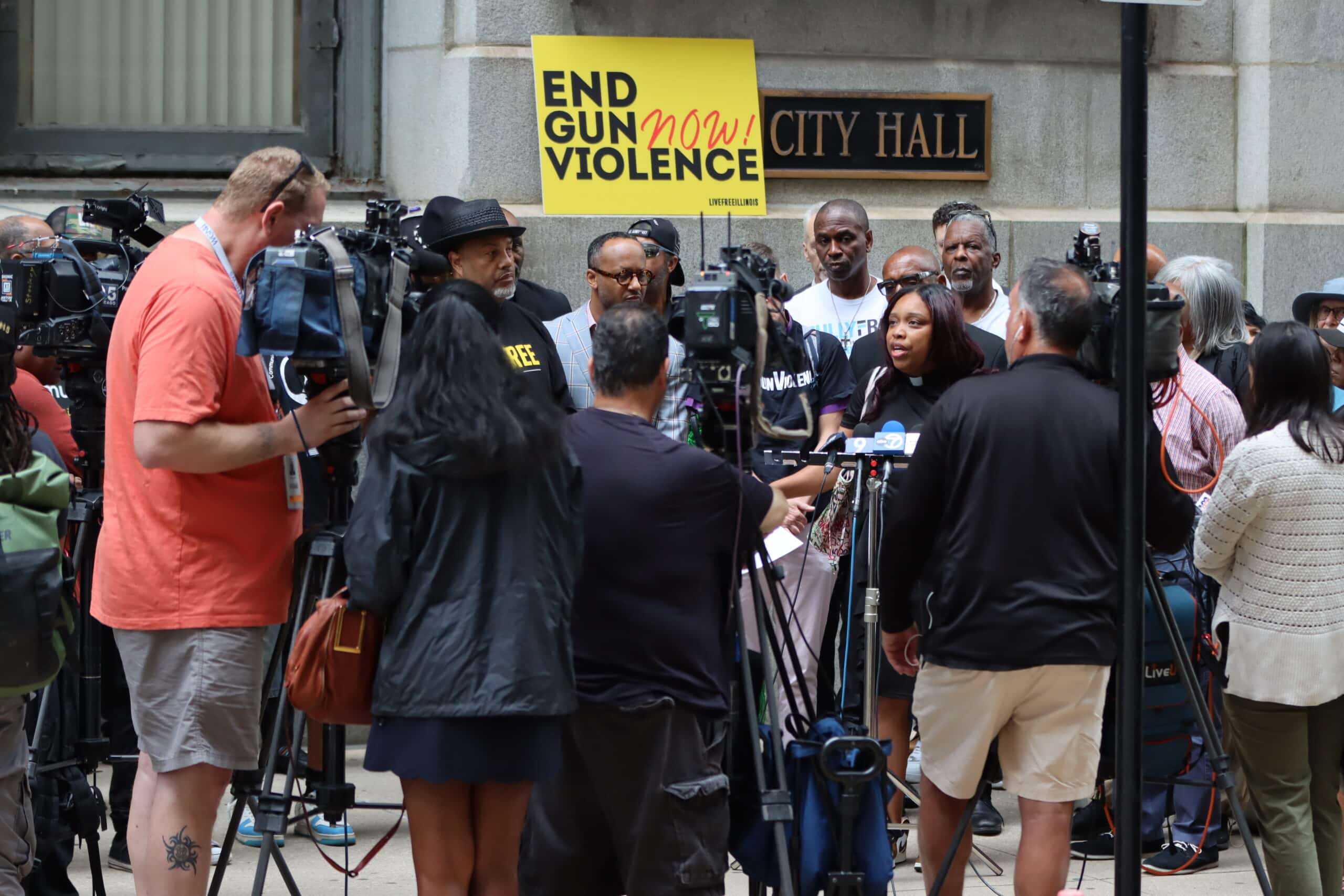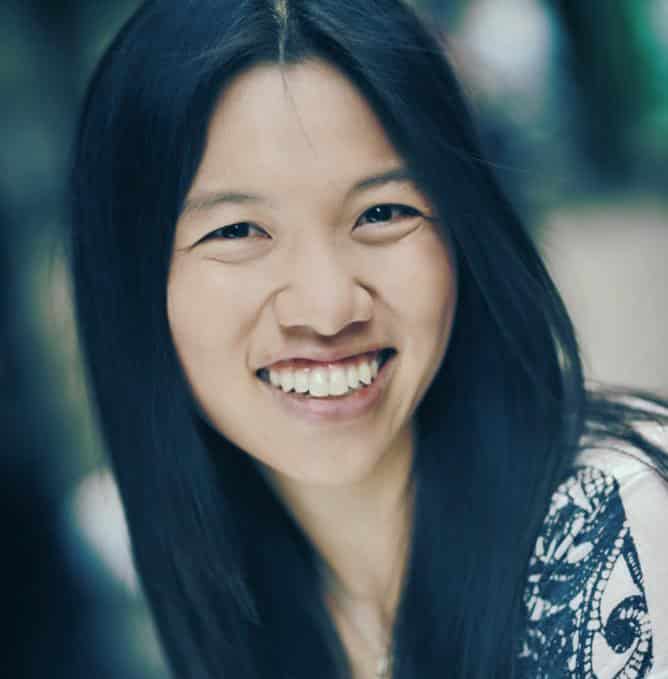Fact checked by Derick Wilder
Charnesha Collier knew she was hearing gunshots as soon as the pops started.
Her mind jumped to the safety of the group of teens she had taken to work on a house in Chicago’s Humboldt Park neighborhood.

Collier was the crew leader then with the River City Community Development Center — R City — a faith-based Christian nonprofit organization in West Humboldt Park. Her first instinct was to protect the kids under her care.
“We want to take cover, get down off the scaffold, and just lay low,” she says. On that day, no one was injured.
“As mentors and as crew leaders, we have to make sure that our kids are safe,” she says. “If we’re at a job site, and there is a shooting, we pack up everything and leave for the day just to keep our kids safe.”
Collier, who grew up in Humboldt Park, leaned on paid tuckpointing apprenticeships through R City’s HarambeeCitybuilders program to keep her occupied as a teen. People running the program saw leadership skills in her, and her role went from apprentice to program director, with a few other roles in between. Now, she’s R City’s executive director.

She knows firsthand that having something to do after school saves teens from getting into trouble. “It doesn’t even have to lead to gun violence. You can be in any type of trouble, jail or getting harmed,” she says.
R City is one of dozens of faith-based organizations throughout Chicago that are mobilizing to address gun violence by investing holistically in youth through enrichment programs, camps, and apprenticeships. Other organizations, such as LiveFree Illinois, have partnered with worship centers throughout the city and state to support faith communities doing healing work in the community.
Last year, LiveFree Illinois received a $1.89 million state grant to equip churches to address trauma, connect their communities with culturally competent mental health professionals, and hold quarterly training sessions to foster long-term engagement with community residents. LiveFree Illinois’ executive director,
Rev. Ciera Bates-Chamberlain, says the organization is currently working with 10 congregations located in neighborhoods throughout the city, including East Garfield Park, Austin, Englewood, and Roseland.

Bates-Chamberlain says it’s imperative for faith communities and houses of worship to address gun violence.
“I could say that there’s some type of theological framing that we can give as to why it’s important as a faith community, but I wouldn’t even go that deep,” she says. “We live in communities where we see people dying; we see our neighbors dying. Therefore, it’s the faith community that, although we may differ on a lot of doctrines, one thing that we do value is human life. And so, because we all value that, we know that when we see people suffering, that that calls for a direct response from everyone.”
The Zakat Foundation of America, a nonprofit philanthropic organization based on Koranic traditions, co-hosted a Hyde Park event in February to speak out against gun violence and raise funds for communities hit hardest by it.
Amina Demir, the chief operating officer of Zakat, says it’s crucial that people understand that gun violence is a deeply embedded, systemic public health issue.
“Not only is addressing gun violence really, really necessary when it comes to building a community back up, but it’s also pivotal in a sense of prevention,” she says. “You can’t really move on or grow or develop if you’re unaware of why we’ve gotten in this place that we’re in.”
Zakat’s holistic approach includes education, providing prevention efforts and targeting the youth, whom Demir says get engaged “at a very, very young age in gang initiation and gun violence, and then it kind of grows with them throughout their adolescence and adulthood.”
That risky environment, combined with a lack of educational institutions and nutritional food resources, as well as the opioid epidemic, contribute to violence in the Chicagoland area. “You have to address the full spectrum,” Demir says.
Like Zakat, R City, begun by River City Community Church, also has a holistic mission, Collier says.
Its free enrichment programs begin in kindergarten, and its paid apprenticeships start at age 12 as a way to eventually provide teens with a job.
Children and teens receive an educational stipend for life skills classes they take that accompany the apprenticeships and cover areas such as money management, job interviews, and resume development. Twelve-year-olds earn about $100 every two weeks, and older teens can take home $640 biweekly if they show up for classes and apprenticeships five days a week during summer programs. This program also operates during the school year, when teens earn smaller amounts for shorter days.
Steve Epting, senior pastor at Hope Community Church in Chicago’s Austin neighborhood, says he brought a passion of outreach and community engagement to the congregation 20 years ago when he became pastor. The church has always had a history of work in the community, and Epting has continued to broaden the church’s reach throughout the years.
Hope Community puts safety first. Its violence prevention work mobilizes churches, block clubs, businesses, and police when there’s been an uptick in violence. “I began this work with the understanding that if we’re going to stop violence, we have to find the moral voice as it relates to love for people,” he says. “And then, how do we create relationships?”
Epting leads the 15th District faith- based collaboration with the Chicago Police Department and trains block clubs, businesses, and faith organizations in community engagement.
But the key, Epting adds, is to develop trusting, nonjudgmental relationships with people in the Austin neighborhood. Those relationships result in regular, meaningful conversations. Once that kind of relationship has been developed, Epting says true learning begins — for everyone.
“When you show a person that you care, it starts to change the way they look and see circumstances,” Epting says. “Hopefully, guided by faith, these youngsters will grow up with plenty of viable alternatives to living with guns.”
And their experiences will build their faith in the community around them, too.
Above photo courtesy of Rev. Ciera Bates-Chamberlain (pictured far right), and Live Free Illinois
Originally published in the Fall 2024/Winter 2025 print issue.

Erin Chan Ding is a Chicago-area journalist and editor who writes about travel, fitness, trends, tech, and the intersection of race and identity.











